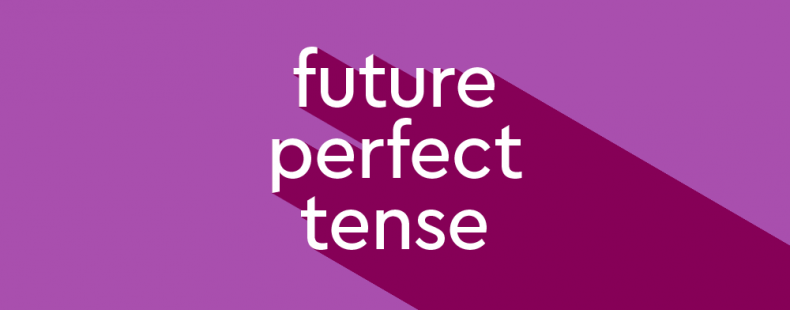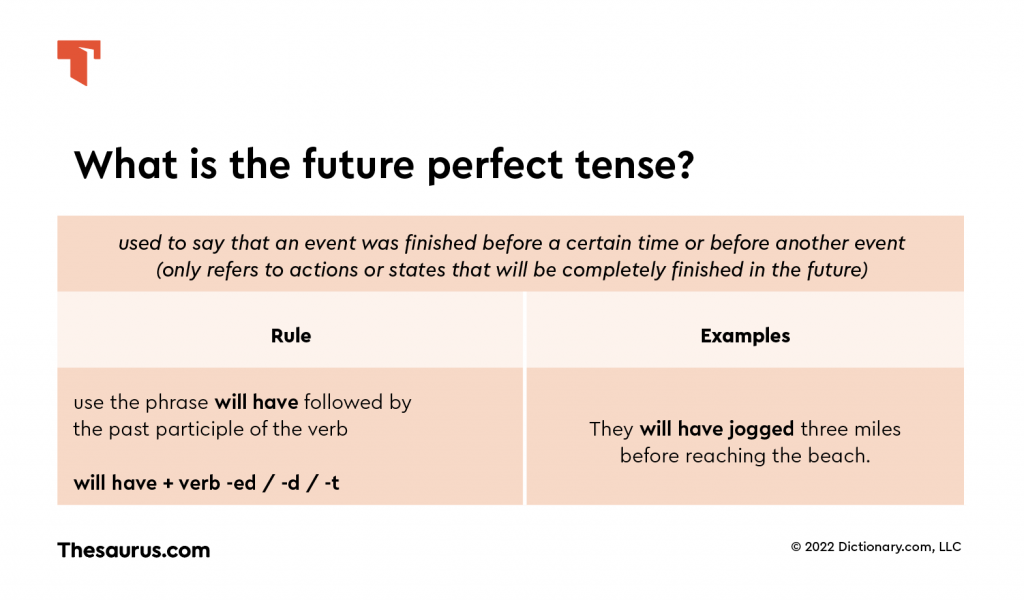By the time you’re done reading this article, you will have improved your grammar knowledge immensely. … Wait, what’s going on in that last sentence? Is it talking about the future as if it were the past? Are we about to enter a time machine? No, we are going to learn about an interesting way that we use verbs to talk about the future. By the time we are finished, you will have learned a lot more about a cool bit of English verb usage: the future perfect tense.

What is future perfect tense?
Verbs are words that we use to refer to actions or states of being. English, as with other languages, uses several different types of verb tenses when we place verbs into sentences. The tense of the verb, generally speaking, tells you when in time an event is happening. The verb tense we will look at now is the future perfect tense. The future perfect tense refers to an action or state that will finish sometime in the future before some other event in the future.
The following sentence uses the future perfect tense:
- I will have cleaned my room before my parents come home.
If we look closer at the name of this verb tense, it actually tells us how we use it:
- Future: The verb tense refers to an action or state that will happen in the future.
- Perfect: Generally speaking, perfect verb tenses refer to completed actions/states. While this may seem odd when referring to the future, the future perfect tense is typically used to say that a likely future event will be completed before another one begins.
Take a look at the part that participles play in verb tenses and more.
When do you use future perfect tense?
Typically, we use the future perfect tense to say that an event was finished before a certain time or before another event. This is how the future perfect tense differs from simple future tense. Look at the following two sentences and see if you can tell the difference between their meanings:
Simple future tense: When the sun rises, we will leave.
Future perfect tense: When the sun rises, we will have left.
Can you see the difference? The first sentence says that we will wait until the sun rises and then leave at that exact moment. The second sentence says we will leave before the sun rises at all.
This comparison shows the most common reason that we use the future perfect tense: to indicate that one future event will happen before another. You can see the future perfect tense used for this reason in the following sentences.
- I expect I will have finished my painting before the art collector arrives.
- According to Katie, she will have bought a dog house by the time we bring the puppy home.
- The workers will have finished all the repairs when we return from our vacation.
When we use prepositions like by or before or the prepositional phrase by the time, we can often use the future perfect tense and simple future tense interchangeably because it is clear which event is happening before the other. The following pairs of sentences have the exact same meanings:
Future perfect: I will have built the shed by Saturday.
Simple future: I will build the shed by Saturday.
Future perfect: Ideally, Chris will have cooked the turkey before his sister arrives.
Simple future: Ideally, Chris will cook the turkey before his sister arrives.
Future perfect: By the time winter comes, we will have stocked up on enough food.
Simple future: By the time winter comes, we will stock up on enough food.
Keep in mind that we do not use the future perfect tense if there is no stated deadline or if we aren’t comparing future events. Instead, we use the simple future tense. For example:
❌ Incorrect: I will have become a famous musician someday.
✅ Correct: I will become a famous musician someday.
Lastly, we only use the future perfect tense to refer to actions or states that will be completely finished in the future. If an action or state is not finished or is in progress, we use the future continuous tense or future perfect continuous tense. You can see the an example of this in the following sentences:
Future perfect tense: By sunset, I will have worked on my homework. (You will be done working by sunset.)
Future continuous tense: By sunset, I will be working on my homework. (You will be in the middle of work by sunset.)
Future perfect continuous tense: By sunset, I will have been working on my homework for two hours. (When sunset comes, you will have finished two hours of work, but you will still continue to work after sunset as well.)
The learning keeps going and going with this primer on the future continuous tense!
How to form future perfect tense
To form the future perfect tense, we use the phrase will have followed by the past participle of the verb. For regular verbs, the past participle is a form of the verb that ends in -ed or -d. For example, the past participle of walk is walked. Some verbs also have a -t variant in the past participle where the verb ends in –t rather than -ed. For example, the past participle of dream is dreamt and the past participle of spill is spilt.
However, there are many irregular verbs whose past participle doesn’t follow this rule. You will need to learn these verbs or search for them in our incredible dictionary. Some examples of irregular verbs include:
- got → gotten
- speak → spoken
- catch → caught
- choose → chosen
- learn → learnt
- hear → heard
The following sentences include examples of regular and irregular verbs in the future perfect tense:
- She will have jogged two miles before reaching the post office.
- Hopefully, I will have won the championship by the next time we speak.
- I am pretty sure this meat will have spoiled by the time the cookout starts.
- The lazy lions will have slept for hours when the zookeepers come to feed them.
How to make future perfect tense negative
It is a piece of cake to make the future perfect tense negative. All you need to do is put the word not between the words will and have:
- I will not have painted the whole garage by the time you get here.
- Based on past experience, my cat will not have enjoyed her time at the vet when I pick her up.
You can also use the contraction won’t (not “willn’t”):
- At his current pace, Ryan will not have completed all the exercises by the time the personal trainer returns.
- At his current pace, Ryan won’t have completed all the exercises by the time the personal trainer returns.
- Based on the rate we are going, we won’t have used up all the laundry detergent before our next shopping trip.
- Based on the rate we are going, we will not have used up all the laundry detergent before our next shopping trip.
Perfect grammar has never been easier
Improve your writing with Thesaurus.com’s Grammar Coach™, which catches grammar and spelling errors and provides Thesaurus-powered synonym suggestions. Using machine learning, this tool can definitely correct tricky subject-verb agreement issues—and more.
Whether you’re writing about the past, present, or future, start writing smarter today!















